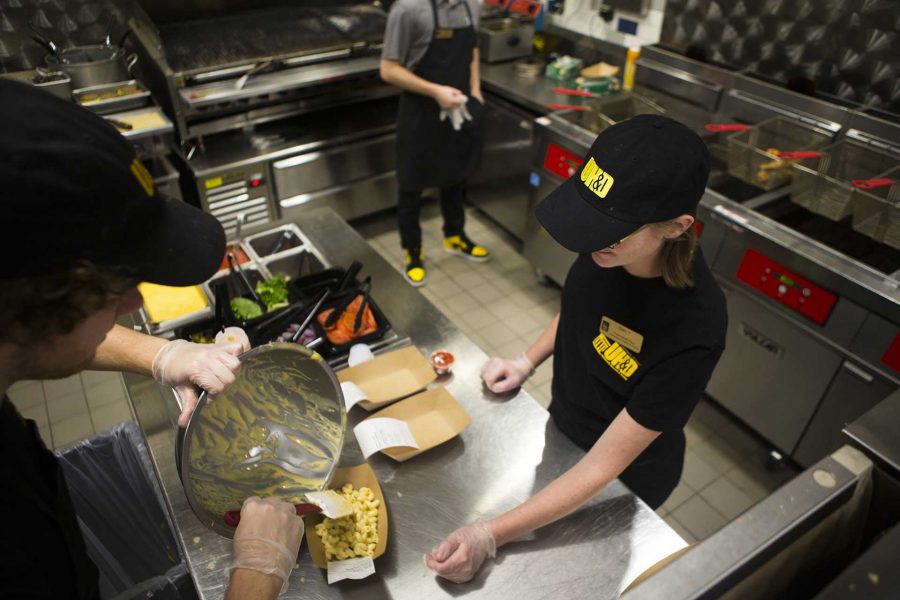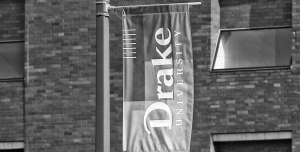Shaw: UI students shouldn’t take more than they can chew
UI Dining needs to think of other ways to repurpose their food in a more proactive way where food waste is not only limited, but the homeless and food-insecure population in Iowa City can be serviced as well.
UI sophomore Daniel Lunde helps pour mac n’ cheese while UI junior Emily Lowery waits to fulfill the order in the Fire Up Late Night Grill in Catlett Residence Hall on Wednesday, Oct. 25, 2017. The food window opened up Monday to students. They are open Sunday-Thursday, 9 p.m. to midnight.
December 6, 2018
As a resident of Catlett Hall, I eat at the dining hall twice a day on average. Something that I see on a daily basis is immense food waste by students who put more on their plates than they can actually eat, resulting in mounds of wasted food on the conveyor belt into the kitchen. While the university does engage in composting, there are other ways UI Dining can manage their waste, including a reduction of how much food they prepare in the first place.
UI Dining Director Jill Irvin has tried to reduce post-consumer food waste — what is left in the buffet — with the elimination of trays in dining halls. Officials made the decision hoping to reduce students’ impulse to take more than they can handle. For the most part, it has worked in reducing the amount of food waste the university receives. However, more can be done education-wise, and students need to know the effect they have when they don’t understand their own limits.
RELATED: Newby: Off-campus living pushes poverty statistics higher
When students take more than they can chew, they are not only wasting food, they are reducing the amount of food that could be repurposed in other ways or given to the disproportionate number of homeless and food-insecure people who live below the poverty line in Iowa City. According to Data USA, 17.9 percent of people in Johnson County live in poverty. That’s a large number of people who struggle with hunger, and with winter upon us, a meal could go a long way.
The reason post-consumer food waste is such a problem is because once food has been served to the public, it cannot be donated, meaning leftover food in the buffet cannot be packaged and donated to shelters. This is because bacteria are introduced at this stage, and repurposing this food by giving it to the homeless or food-insecure individuals wouldn’t be safe. Homeless and food-insecure individuals should be welcomed into the marketplaces right before closing time to eat food that has been served to the public before it is composted or thrown away. This way, food waste is reduced even more, and those who struggle with hunger can be served as well.
RELATED: Laursen: UI dining can be different
Currently, all the university does to combat food waste is repurpose pre-consumer food waste — food that hasn’t been placed in the buffet for students to pick up.
However, most of that pre-consumer food waste does not actually leave the dining halls for the homeless and food-insecure population on a regular basis. Instead, it is repurposed in the dining halls themselves for more meals in the future, which is great for maximizing the budget and saving students money on their meal plans. The only times the university donates food waste to the populations in need is typically when a break or holiday is approaching. Then, the university reaches out to Table to Table, an organization that has served as a connection between abundance and hunger in Johnson County for 23 years, Executive Director Nicki Ross said.
RELATED: Kumar: Poverty and homelessness persists in Iowa City
The UI and Table to Table have a partnership with the IMU catering program and several dorms including Catlett and Burge Marketplace. There, Table to Table picks up whole pans of food and collects leftover ingredients. Irvin said the reason the UI doesn’t reach out to Table to Table on a regular basis except for catering is because there’s not enough food to repurpose.
It’s hard for me to accept that, because I believe any little bit of food that could go to those in need would help in a big way. By donating food on a regular basis, people’s lives could be improved and give them a fighting chance this winter.
Perhaps the university could expand its partnership with Table to Table for not just holiday breaks but on a more regular basis, such as once a week, in which the organization could collect food from Hillcrest and the various cafés on campus, too.
As for students, always think about ways you can get involved and only pick up what you can chew.






